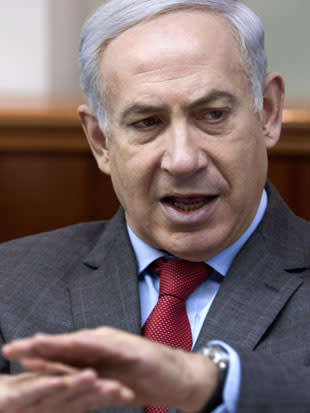 The Ticket
The TicketObama, Netanyahu, in crisis talks on Iran

President Barack Obama and visiting Israeli Prime Minister Benjamin Netanyahu—never good friends under the best of circumstances—meet on Monday starkly at odds over whether and when they may need to attack Iran to prevent Tehran from getting a nuclear weapon.
In the days running up to the talks, Netanyahu made clear he wants Obama to take a far tougher line on Iran, while the president escalated his warnings to Tehran but paired them with a blunt message that he will not be rushed or bullied into military action.
"Already, there is too much loose talk of war," he said in a defiant and sometimes defensive speech to the influential American Israel Public Affairs Committee (AIPAC) lobbying group on the eve of the meeting.
"For the sake of Israel's security, America's security, and the peace and security of the world, now is not the time for bluster; now is the time to let our increased pressure sink in," he said.
Ironically, there's an argument to be made that what Obama and his guest will discuss is escalating a campaign against Iran's nuclear program, not launching one.
There is widespread talk that the United States and Israel are already waging a covert war against Iran's nuclear and missile programs -- so widespread that it was featured in a controversial Israeli ad for Samsung tablets.
But a top Obama adviser disputed that the "loose talk" remark specifically targeted Israel, saying it referred to "everyone, press, politicians, pundits."
Netanyahu, speaking to reporters in Ottawa before heading to Washington, underlined that Obama in the speech had refused to rule out military action and had declared that containment was not an option while emphasizing that Israel had the right to "defend itself by itself."
The rest of the world may be wondering: Are we going to war again? How soon? The meetings are unlikely to answer those questions, at least publicly. But there could be clues, at least, to whether the staunch allies have narrowed the chasm now dividing them.
The two leaders' scheduled calls for remarks to the press before their talks—when they can safely restate their well-known public positions without risking media reports that they failed to come together.
But in a potentially telling bit of logistics, Netanyahu meets at 3:30 p.m. with Defense Secretary Leon Panetta, who then crosses the street from the Blair House for visiting dignitaries to see Obama at the White House at 4:45 p.m.
That's sure to revive talk about whether America could give Israel more advanced weaponry better able to reach Iran's hardened nuclear sites.
Another major clue may come when Netanyahu addresses (AIPAC) at 10 p.m. on Monday, remarks that will be closely watched to see whether he seems supportive, or at least temporarily satisfied, with Obama's approach.
Both leaders worry, despite Tehran's denials, that Iran's nuclear program is really a covert effort to develop the ability to build an atomic weapon. And both say they cannot live with a nuclear-armed Iran and agree that all options must be on the table—a foreign policy cliché that really only refers to military force—to prevent it.
But they differ on two critical issues: The timeline for action, and the so-called "red lines" that Iran cannot be allowed to cross.
Israeli Defense Minister Ehud Barak, who has praised Obama for enhancing the American-Israel security relationship, has warned that Iran's nuclear program may be entering a "zone of immunity" when it could be impossible to disrupt it by force.
U.S. officials doubt that Iranian facilities are really "impregnable"--but interestingly, top U.S. officials including Obama have taken the view that a military strike even now could only delay not destroy Iran's nuclear drive, and that ending it must be a decision taken in Tehran.
"Our assessment, which is shared by the Israelis, is that Iran does not yet have a nuclear weapon and is not yet in a position to obtain a nuclear weapon without us having a pretty long lead time in which we will know that they are making that attempt," Obama told The Atlantic in an interview published Friday.
"In that context, our argument is going to be that it is important for us to see if we can solve this thing permanently, as opposed to temporarily. And the only way, historically, that a country has ultimately decided not to get nuclear weapons without constant military intervention has been when they themselves take [nuclear weapons] off the table. That's what happened in Libya, that's what happened in South Africa," he added.
The two men have a prickly relationship—administration officials haven't forgotten the startling public lecture Netanyahu gave Obama in the Oval Office in May 2011—a notion Obama did little to dispel in the interview. "I actually think the relationship is very functional," the president insisted. "We can be very frank with each other, very blunt with each other, very honest with each other."
More popular Yahoo! News stories:
• Poll: Santorum slightly ahead in Ohio before Super Tuesday
• Mitt Romney wins the Washington state caucuses
• Santorum bets on Ohio for Super Tuesday
Want more of our best political stories? Visit The Ticket or connect with us on Facebook, follow uson Twitter, or add us on Tumblr. Handy with a camera? Join our Election 2012 Flickr group to submit your photos of the campaign in action.

